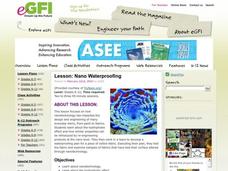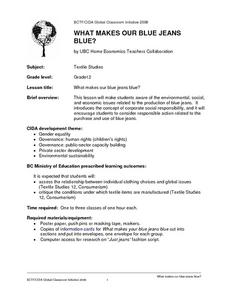Curated OER
Sewing Unit (Textiles)
Get out that sewing machine it's time for a textile project. The class learns how to use a sewing machine, read a pattern, and create a simple article of clothing. They identify the sewing machine parts, use an iron, and think about...
Curated OER
Materials
This interactive presentation is a visual delight for young eyes! The title slide allows you to click on one type of material: wood, fabric, plastic, metal, or paper. You are then taken to a slide to consider numerous objects and...
Global Oneness Project
Rethinking the Fabrics We Wear
What are fibersheds and what what do they have to do with environmental protections? A photo essay and audio recordings about Mimi Luebbermann, and her sheep, cause consumers to reflect on how their clothing choices can support local...
Curated OER
Personal Narrative Paragraphs: Class Quilt
Begin this activity by asking third graders to bring from home pieces of cloth that represent something important to them. (Have extras for students who need them.) They reflect on important events in their lives, compose narrative...
Curated OER
Making Cloth: The Impact of Technology
Students analyze and discuss several primary source documents that address the changes in technology that affected New England agricultural communities in the early 19th century. They also identify and discuss historical contexts for...
Curated OER
Kuba African Cloth
Students identify four different African cloth design styles and associate them with the cultures examined in this lesson. The lesson also includes a creative project where each student creates their own cloth design.
Curated OER
Applied Science - Science and Math Lab
Young scholars examine fabric. For this Applied Science lesson, students look at the fibers of fabric through a microscope. Young scholars compare and contrast a variety of fibers.
Curated OER
Interior Design- Textiles
Young scholars investigate natural and synthetic fibers. In this textiles lesson, students pass around samples of carpet, drapes and clothing and decide what they are made of. Young scholars use KWL charts to organize information from...
Curated OER
Nano Waterproofing
Students experiment to determine a way to waterproof a piece of cotton fabric. In this scientific inquiry lesson, students use reference worksheets to explore waterproofing and the use of nanotechnology in engineering everyday...
Curated OER
WHAT MAKES OUR BLUE JEANS BLUE?
Twelfth graders become aware of the environmental, social and economic issues related to the production of blue jeans. They explore the relationship between individual clothing choices as well as global issues. In addition, they...
Curated OER
Fabric All Around
Students explore human senses by participating in an arts and crafts activity. For this fabric identification lesson, students discuss the uses for fabric and the history of cloth. Students identify the different materials in their...
Curated OER
Clothesline Sleuth
Sixth graders investigate the origins of clothing production. In this Social Studies lesson, 6th graders examine the components of agriculture involved in making clothes. Students research cotton.
Curated OER
Using Fabrics in Your Art Curriculum
Young scholars use a dicut machine to do block printing on fabric. In this fabric lesson plan, students draw, carve, and print onto blocks for this art project.
Curated OER
Textiles and Apparal
High schoolers create apparel. In this career connection lesson, students create displays that feature textile and apparel samples.
Curated OER
Telling Tales About Textiles
Students analyze the different types of textiles, processes for creating cloth, and inventions utilized to manufacture industrial goods. In this Telling Tales About Textiles lesson, students weave on a card loom to create their own...
Curated OER
Fabric and Their Raw Materials
In this agriculture worksheet, 3rd graders match fabrics to raw materials. They draw pictures of items that are made of each raw material such as wool, cotton, silk, and nylon.
Curated OER
4-H Clothing and Textiles Leader's Page
This activity could be used in a home economics class to teach students about sewing and clothing. Using this 10 question learning exercise, learners explore the function of a sewing machine, and plan a project.
Curated OER
4-H Clothing and Textiles Activity Page
This activity provides a unique review of clothing and textiles, focusing on sewing. It includes a handy diagram of a sewing machine, which could be useful in a home economics class, and 10 questions.
Curated OER
Vocational: Fashion History
Students research and present reports on 20th century fashions and their influences. After watching a video about fashion, they complete worksheets based on the film. In another activity, students make doll-sized clothing items using...
Curated OER
Fibers and Fabric
Young scholars are introduced to a variety of different fibers. After acting out a short story, they discover how yarn and basic weaves are made. To end the lesson, they practice making their own weave pattern using paper strips and...
Curated OER
FACS:Nanotechnology and "Smart" Textiles (IT)
Students research and define nanotechnology and how nanotechnology products are being used in the development of new textiles for different industries. They demonstrate basic flaws found in the clothing industry today: shrink, fade,...
Curated OER
Fabric Construction Chart
Students in sewing class review the various types of natural and synthetic fabrics. They take notes about fabric construction and match woven, knit, and non-woven fabric samples to fabric construction charts. They make specific...
Curated OER
Warm and Toasty
Students are introduced to the concepts of specific heat and heat capacity. In groups, they design an experiment to test these two topics on various fabrics. They compare and contrast the amount of heat loss on the different materials...
Curated OER
Comparing Patterns In Chinese And American Textile
Students create Chinese jacket designs using magic markers and paper jackets as well as knowledge of Chinese and American textile designs and techniques in this upper-elementary lesson.

























